- Home
- Craig Schaefer
Wisdom's Grave 01 - Sworn to the Night Page 2
Wisdom's Grave 01 - Sworn to the Night Read online
Page 2
“Spill it,” she said.
“Baby Blue is—” He paused, his fingers tracing her photograph, the curve of her cheek. “Electric. That’s the only word for it. She’s not like other girls, you know? She’s a goddess.”
Marie nodded. They’d talked to every man on her regular client list. They’d all said the same thing, in almost the exact same words.
“I wasn’t her last client that night. She had a thing. A party.”
“A party?” Tony asked.
“Some kind of a private club deal. I don’t know, dancing maybe. See, I tried to get her to stay the night. I did that sometimes when I had the cash, but she already had this other thing lined up. And it was a lot of cash. I guess her—her, uh, manager didn’t know about it.”
Marie’s hand tightened on the armrest of her chair.
“She’s been missing for a week,” she said, “you had information that could have helped us find her, and you’re just now deciding to share it?”
Eddie screwed up his face. “Look, all I got is an address. She didn’t exactly give it to me, not in so many words. I was worried about her, so…”
“You were stalking her,” Tony said.
“I was worried. But these people—this isn’t some low-rent massage parlor where you get a rubdown with your rubdown, all right? These are serious people. Connected.”
“Connected?”
“Connected. Like the kind of people you don’t rat on unless you want a good look at the bottom of the Hudson. That’s what Baby Blue said, anyway. She was scared. Just not scared enough to turn down the money.”
“These parties,” Marie said. “Where?”
Eddie took a deep breath, held it, then let it out in a resigned sigh. Deflated, he opened his desk drawer and pulled out a crumpled slip of paper.
“Near Monticello. A house off NY-17, middle of nowhere. Good enough? We done here?”
Marie stood, snatched the paper from his fingers, and picked up the photograph. She held the picture in his face, giving him one long last look.
“You better hope she’s there, alive, Eddie. Otherwise? You’re going to see me again.”
* * *
Out in the car, Tony drummed his fingers on the steering wheel.
“You know we’re looking at a two-hour drive there, two-hour drive back, right?”
Marie buckled her seat belt.
“We can pass this tip along,” he said. “Let the locals check it out. We don’t have to do all the legwork ourselves.”
Marie opened her wallet. A trio of rumpled photographs snuggled next to a yellowed library card and a few small bills. She took out the photographs—headshots, young, pretty—and held them up one by one.
“Vicky Wagner. Disappeared. Two weeks later, found butchered in a dumpster. Lottie Holmes. Disappeared. Two weeks later, found butchered in a dumpster. Letisha—”
“I get it,” Tony said.
Marie held up the photograph of Baby Blue.
“She’s running out of time. I don’t care what the brass says, Tony. We’ve got a serial killer preying on sex workers. You know it, I know it, and nobody seems to give a damn. So no, we’re not ‘passing the tip along.’ I’m not trusting the locals to do shit. This woman is counting on us, and I will not let her down.”
The sedan’s engine thrummed to life, rumbling under the squawk of the radio. Tony threw the stick into drive and eased into traffic.
“You can’t save ’em all, you know.”
Marie folded her arms and stared straight ahead.
“Have to try,” she told him.
They drove north, then northwest, breaking away from the curve of the river and leaving the urban sprawl at their backs. They rode in the shadow of the Catskills past summer homes and villages, old resort towns clinging to life, bits of rust nestled in the bloom of spring. Past a barely marked exit and a dirt access road, the sun filtered through the boughs of wooly hemlock trees.
The house at the end of the road stood alone. It leaned this way and that, its second-floor arches sagging under the weight of weather and time. Scraps of bone-white paint clung to the rotten wood like memories of a happier age, most of the siding gone the color of cigarette ash. Some of the windows were broken, smashed by rocks, others caked with dust.
“Oh yeah, this place is party central,” Tony said. “I think our pal Eddie might possibly have been full of shit. How do you wanna play this?”
Marie stared at the front door, thinking it over. “No cars out front. Let’s see if anybody’s home. If not, we can peep through the windows, see if we spot anything interesting.”
They pulled up the drive. As they stepped out of the car, a pinched, frightened face loomed behind one of the second-floor windows. Marie held up her badge and smiled.
“Good afternoon! NYPD. Could we have a moment of your time, please?”
The front door swung open. The man behind it, a stringy-haired seven-foot giant in filthy overalls, stumbled out onto the porch and squinted at the sunlight.
He leveled the shotgun in his hands, taking aim at the detectives, and pulled the trigger.
Two
Marie dropped low behind her door as the shotgun roared. Buckshot tore into the sedan’s hood and splintered the windshield. She had her pistol out in a heartbeat, her training taking over, reaching around the car door to snap off a couple of wild shots. Tony lay low across the front seat and shouted into the radio.
“Ten-thirteen, we are under fire. Repeat, we are under fire—”
The shotgun boomed and he jerked his face down, pinned under a sudden rain of shattered glass. The next shot hit Marie’s door, shredding metal and making buckshot dance off the dry dirt inches away. More glass broke—not the car this time, one of the house windows—and the thudding clack of a revolver joined the fray as someone on the second floor opened fire.
Marie looked across to Tony, both of them huddled low. “Wait for it,” she said through gritted teeth.
Buckshot raked across the bumper, peppered the grill, blew out the left tire in a hiss of dead air. The sedan slouched on three wheels and Marie and Tony came up from cover as one, unloading on the giant, aiming for center mass. The shotgun clattered to the porch and he staggered back as gunshots punched into his dirt-encrusted overalls. He grabbed the edge of the open door as he fell, leaving a slug-smear of blood across the rotten wood.
Marie ducked again as another round cracked over her head. The second shooter was inside the house. She popped her empty magazine, reloading fast, fingers driven by muscle memory.
“Cover me,” she said. “I’m making a run for it. Gonna see if I can find a rear entrance and come at him from the other side.”
Tony’s eyes bulged at her from the driver’s side of the car. Another bullet drilled into his door and rattled the battered sedan.
“Are you crazy? Wait for backup!”
“We’re in the middle of nowhere,” she said. “These are the guys, Tony. She could be in there right now, and I’m not giving this asshole a chance to start killing hostages.”
He took one look in her eyes and let out an exasperated sigh.
“Fine,” he said. “Call it.”
“On three.”
At the end of the silent three-count, Tony popped up from behind the car door and laid down a blistering stream of fire. The sniper dropped, pinned, blind for a few precious seconds. Marie broke from cover and streaked across the lawn. Her heart pounded, her vision narrow as a subway tunnel, hemmed in by walls of darkness. Everything was shades of gray at jet-engine speed. There was the back door. Rotten wood shattered under her shoe. The rusted lock snapped like a chunk of peanut brittle. She sprinted inside, weapon braced in both hands. A dusty lilac rug threatened to slide out from under her feet, but she got to the stairs and took them two at a time. The muzzle of her pistol swept over empty doorways. She heard the shooter up ahead, gunshots echoing, faint, everything sounding like she’d plunged a hundred feet underwater.
An old,
pinch-faced man crouched beside his broken window, taking shots at Tony and the car, his back to her. Boxes of ammunition lay scattered across the bare wood floor alongside a couple of rifles, enough firepower to hold off a small siege. Marie trained her gun on him and roared, “Police, drop the fucking gun. Drop it right now!”
He spun, surprised—no, she thought, terrified—and his jaw dropped. The revolver, tight in his grip, twitched at his side.
“Had t’do it,” he drawled, his lips puffy and cracked.
“Drop the gun.”
“King comes a-callin’, gotta dance. Gotta dance to the tune he plays.”
Marie held him in her sights. “Drop. The gun. Now.”
His lips twisted into a broken smile.
“Goin’ home now.”
He put the revolver to his head, yanked the trigger, and blew his brains across the dirty window.
Marie stood there, silent, staring as his corpse tumbled to the floor. She was frozen in time, one endless moment, watching trickles of crimson roll in slow motion down the fractured glass and pool on the windowsill. Then a deep rumbling, somewhere under her feet, pierced the silence and jolted her into motion. It sounded like a machine bigger than the house, some great engine, turned on and then quickly turned off again. She hunted the sound.
The cellar stairs leaned into darkness. She moved down, smooth, fast, weapon ready. She stopped at the foot of the steps.
The cellar was filled with people. Maybe twenty or thirty in all. Shadows, standing perfectly motionless in the dark around a hospital gurney in the center of the room.
Marie’s finger rested on the trigger, her other hand reaching out to turn on the lights.
“Freeze! Nobody move, or—”
The overheads flicked on, fluorescent tubes popping and buzzing to life, washing away the darkness.
The room was empty.
She’d seen them. She knew she’d seen them. But as she walked across the cracked concrete floor, the lights humming above her head, she was alone. Alone except for a clutter of cardboard boxes shoved against one cold brick wall, and the dead man on the gurney.
He was naked. Pale. And open like a book. A tray of autopsy tools stood beside the gurney, blades and calipers and rib-crackers coated in congealed blood. They’d ripped him apart from his throat to his belly. Skin peeled back from snapped ribs. His internal organs had been snipped and sliced, rearranged like a puzzle made of flesh. From the ligature bruises on his wrists and ankles, he’d been alive when they did it.
Marie took his arm, turning it, feeling his wrist for a pulse just to be certain. He had a tattoo there, about the size of a silver dollar, a glyph of some kind, jagged and spiraling and strange. She pressed her fingertips over it.
The dead man’s eyes snapped open and he seized her hand with an iron grip.
“Marie,” he wheezed. His glassy, pale-blue eyes locked onto hers. “Hell is watching you.”
He collapsed. His eyes fell shut. His hand went limp, arm dangling off the edge of the gurney.
Marie took a shuddering step back. Her throat felt like she’d swallowed a lump of ice. Upstairs, Tony shouted her name, and it took a second before she could remember how to speak again.
“Downstairs,” she called up. “It’s…it’s clear.”
She reached for the corpse’s wrist a second time, slow, like grasping for the head of a sleeping rattlesnake. No pulse. She rested his arm at his side and, on instinct, took out her phone. She snapped a quick close-up of his tattoo, then stashed the phone as Tony rushed down the cellar stairs.
“You okay?” he asked, breathless.
“No girl. She’s not here, Tony.”
“This guy is, though.” He walked up to stand beside her, shaking his head at the dead body. “Jesus, what kind of freak show did we crack open here?”
She didn’t have an answer. Tony skirted the gurney and tugged open one of the cardboard boxes with the tip of a pen.
“Holy shit, score. At least we know what line of work these guys were in. Check it out.”
Marie stood at his shoulder, grateful for something else to look at, and peered inside. The box was filled with baggie after translucent baggie of tiny black pebbles. On the news, they called it “the new crack.” In their daily briefings, it was “the epidemic,” a new designer drug that had hit the East Coast by storm and flooded west like a gold rush.
On the street, they called it ink.
“Gotta be ten, twelve boxes, ready to sell,” Tony said. “Nobody can find the pipeline, and we just took down a goddamn stash house. By accident. How do you like that?”
She didn’t have an opinion. She silently brushed the back of her hand, her fingers curling over the skin where the dead man had touched her. Marie felt like a ghost as she drifted up the cellar steps and through the house, vacant room after vacant room. A quartet of Monticello police cruisers rumbled up the dirt road with their light bars flashing.
It was a long afternoon. She watched the sun crest, then slide behind the hemlocks, while she sat in the passenger seat of their ruined sedan. Baby Blue stared at her from the dashboard, her smoldering eyes rendering silent judgment. The scene in the cellar played out in her mind’s eye again and again: the disappearing shadows, the dead man speaking her name. Adrenaline, she told herself. Stress under fire. You were hallucinating. It happens.
Ambulances came. Paramedics hauled out the shooters under white sheets. Flash bulbs crackled in the fading light, documenting every angle of the gunfight. Eventually another unmarked sedan rolled up, caked in spring pollen, and Captain Traynor took Marie and Tony aside. He wore a shabby raincoat over his pinstriped shirt and needle-thin black tie, and he spoke in low, easy tones.
“We should be helping with the scene—” Marie said, and Traynor silenced her with a gentle wave of his hand.
“You can’t work the scene, Detective. You are the scene. Listen, both of you, this is how it’s going to be. You’re going to go home and write your reports while everything is still fresh. Don’t turn them in. You’re on administrative leave, starting now, for at least four days. Once you’ve had some time to think things over and compare notes, maybe you’ll want to revise those reports a little.”
Tony put a hand on his hip. “It was a righteous shoot, Captain.”
“And I believe you. But it’s IAB’s job to find trouble where there isn’t any. So take your time, and think real hard about what you’re going to say.” Traynor glanced over his shoulder at the stream of locals tramping in and out of the bullet-riddled house. He ushered the detectives back a few feet. “Don’t want to embarrass you, but…you know how this goes. Badges and weapons. C’mon.”
They handed them over. Traynor held up their gold shields for a moment before pocketing them.
“You’ll get these back once you’re cleared for active duty again. You will get these back. You’ll have to face a panel and answer a whole lot of stupid questions, and you’ll have to get a psych eval. I’ll call you both tomorrow and we’ll get into the details.”
“I don’t need a shrink,” Marie said.
Traynor arched an eyebrow at her. “You ever drawn your piece outside the firing range, Detective? You ever pulled the trigger on another human being before?”
Her gaze dropped. “No, sir.”
“I have. So believe me when I tell you this: you will want somebody to talk to about it. Maybe not tonight, maybe not tomorrow, but you will. Now go home. You’ve done all you can tonight.”
He called up a squad car to give them a ride back to the city. Marie paused at their sedan, leaned inside, and peeled the picture of Baby Blue off the dashboard. The photograph went into her wallet, alongside the three dead women she’d been too slow to save.
Not one more, she told herself.
Not one more.
Three
There were quiet places in the city, tiny sanctuaries, if you knew where to look. Vanessa Roth had found hers in Inwood Hill Park, on the northern tip of Manhattan. She c
ould imagine dinosaurs prowling the ragged, primeval wood, long-billed scavengers picking across the cool salt marshes. She’d found herself a cozy spot on the edge of nowhere, away from the hiking paths and bicycle lanes.
Her eyes blazed like sharp sapphires behind her glasses, the rounded, owlish lenses almost too big for her face. An eager smile played on her lips. Today was the day, she was sure of it. This time it would work. She knelt on a patch of dew-damp grass with a hardbound book open on her lap. The faded type on the yellowed, brittle page read “The Game of Finding a Guide.”
For furtherance of skill, it is essential that the cunning Student of the Art seek a guide, who will teach the virtues of Power and Freedom. This guide may take on the form of a beast of the wild and must be greeted with respect and a proper sacrifice…
Nessa’s offering, a small mound of fresh pecans and beechnuts, sat upon a stone disk carved with a five-pointed star. She’d arranged every nut with precision, carefully turning and placing the food like a Michelin-starred chef plating a celebrity’s dish. Then came the chant. Words rippled from her lips, a song in a dead tongue, so familiar now she barely needed the lines in the book to guide her. They seemed to take on physical form, wafting through the air as a pale vapor, stretching and searching. A warm wind kicked up across the marshes and ruffled her coal-black hair. She tasted salt on her lips and caught the faint scent of blackberries.
Her fervor grew. Beckoning, calling, begging with words she couldn’t even understand, trying to reach out with her heart and her voice. Then she came to the end of the page. The last word of the spell died on her lips. It thudded like a brick in her lap.
Nothing.
She waited there, still daring to hope. A rustling from the underbrush made her eyes go wide.
A white-tailed doe stepped into the clearing. Small, timid, barely older than a fawn, she took a hesitant step toward Nessa. One hoof brushed the moist grass, then yanked back.
“That’s right,” she said softly, “come to me. Come to Nessa. It’s all right.”
Another trembling step. The doe’s big caramel eyes studied her, uncertain.

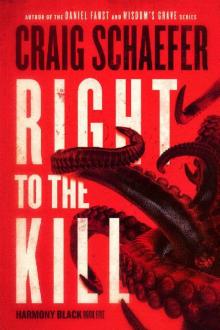 Right to the Kill (Harmony Black Book 5)
Right to the Kill (Harmony Black Book 5)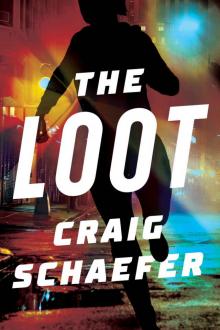 The Loot (Charlie McCabe Thriller)
The Loot (Charlie McCabe Thriller)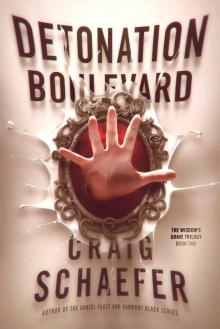 Detonation Boulevard
Detonation Boulevard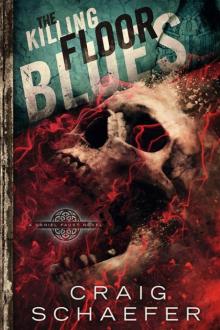 The Killing Floor Blues (Daniel Faust Book 5)
The Killing Floor Blues (Daniel Faust Book 5)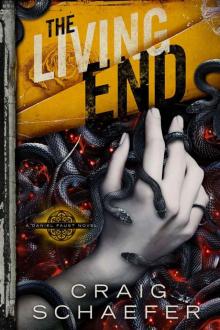 Daniel Faust 03 - The Living End
Daniel Faust 03 - The Living End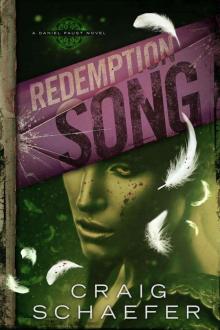 Redemption Song (Daniel Faust)
Redemption Song (Daniel Faust)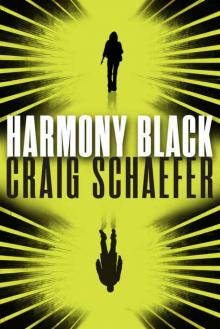 Harmony Black (Harmony Black Series Book 1)
Harmony Black (Harmony Black Series Book 1)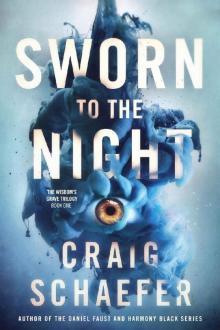 Wisdom's Grave 01 - Sworn to the Night
Wisdom's Grave 01 - Sworn to the Night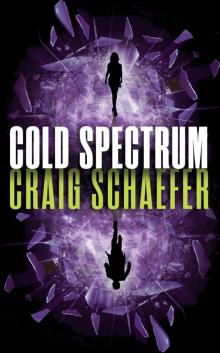 Cold Spectrum
Cold Spectrum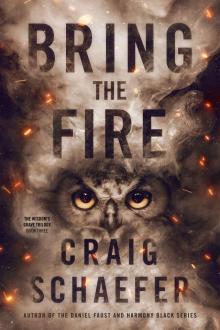 Bring the Fire (The Wisdom's Grave Trilogy Book 3)
Bring the Fire (The Wisdom's Grave Trilogy Book 3)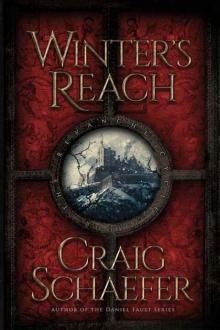 Winter's Reach (The Revanche Cycle Book 1)
Winter's Reach (The Revanche Cycle Book 1)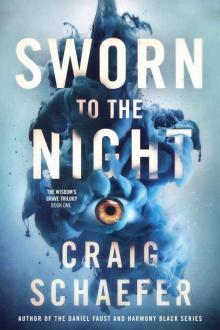 Sworn to the Night (The Wisdom's Grave Trilogy Book 1)
Sworn to the Night (The Wisdom's Grave Trilogy Book 1)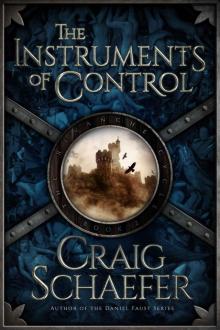 The Instruments of Control (The Revanche Cycle Book 2)
The Instruments of Control (The Revanche Cycle Book 2)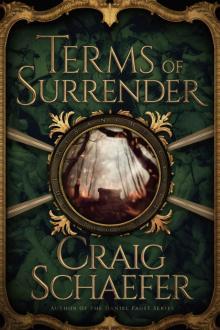 Terms of Surrender (The Revanche Cycle Book 3)
Terms of Surrender (The Revanche Cycle Book 3)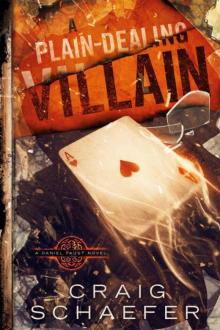 A Plain-Dealing Villain
A Plain-Dealing Villain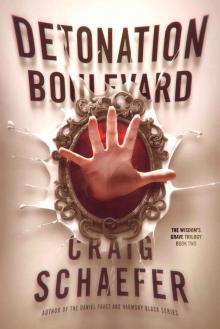 Detonation Boulevard (The Wisdom's Grave Trilogy Book 2)
Detonation Boulevard (The Wisdom's Grave Trilogy Book 2)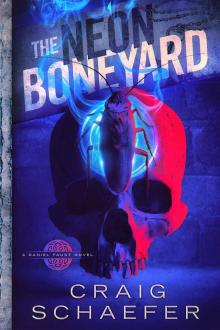 The Neon Boneyard
The Neon Boneyard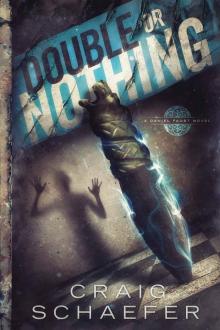 Double or Nothing (Daniel Faust Book 7)
Double or Nothing (Daniel Faust Book 7)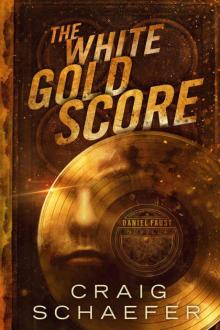 The White Gold Score (A Daniel Faust Novella)
The White Gold Score (A Daniel Faust Novella)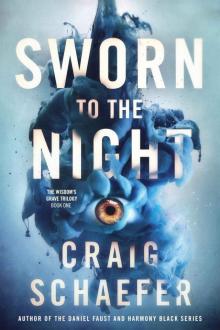 Sworn to the Night
Sworn to the Night